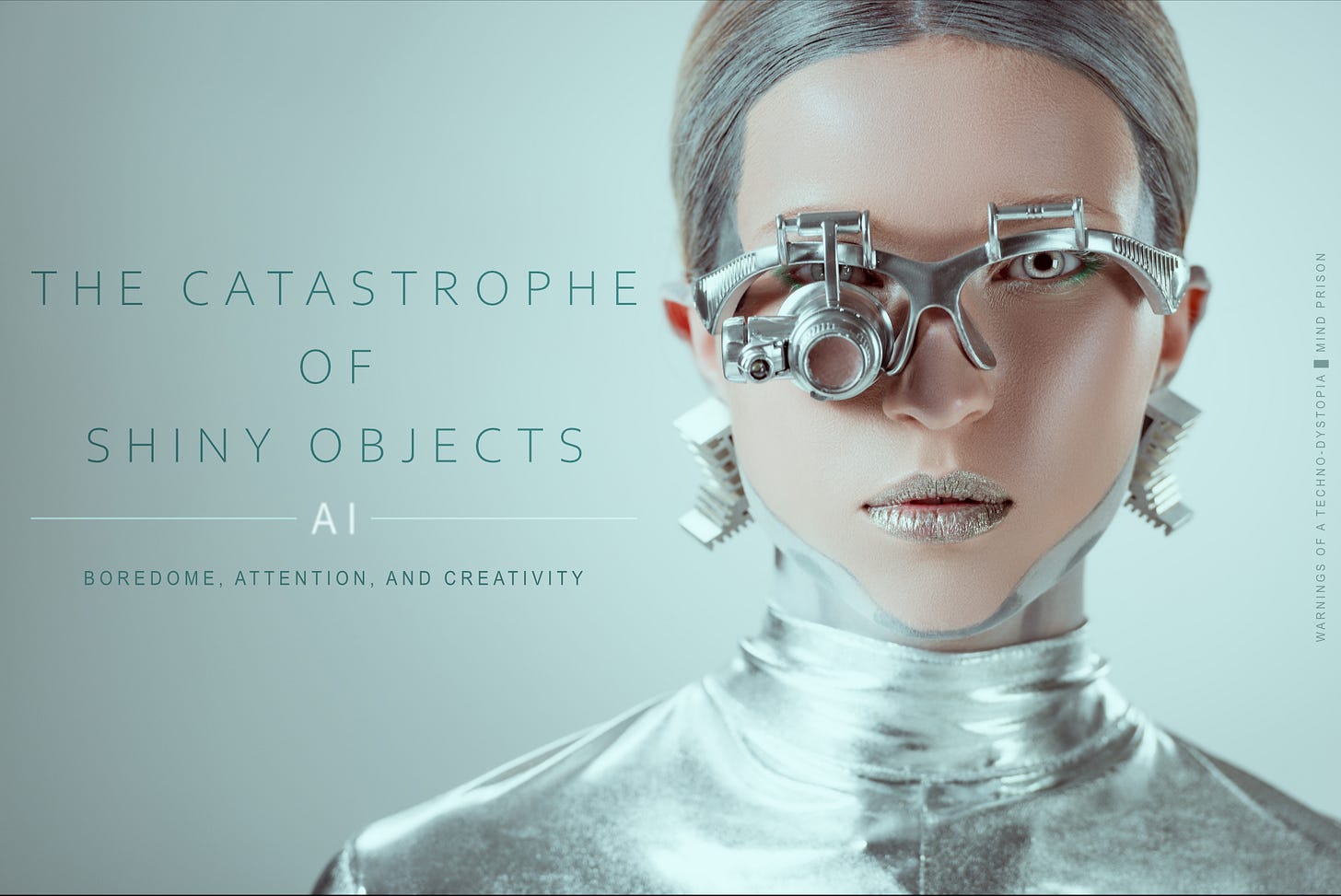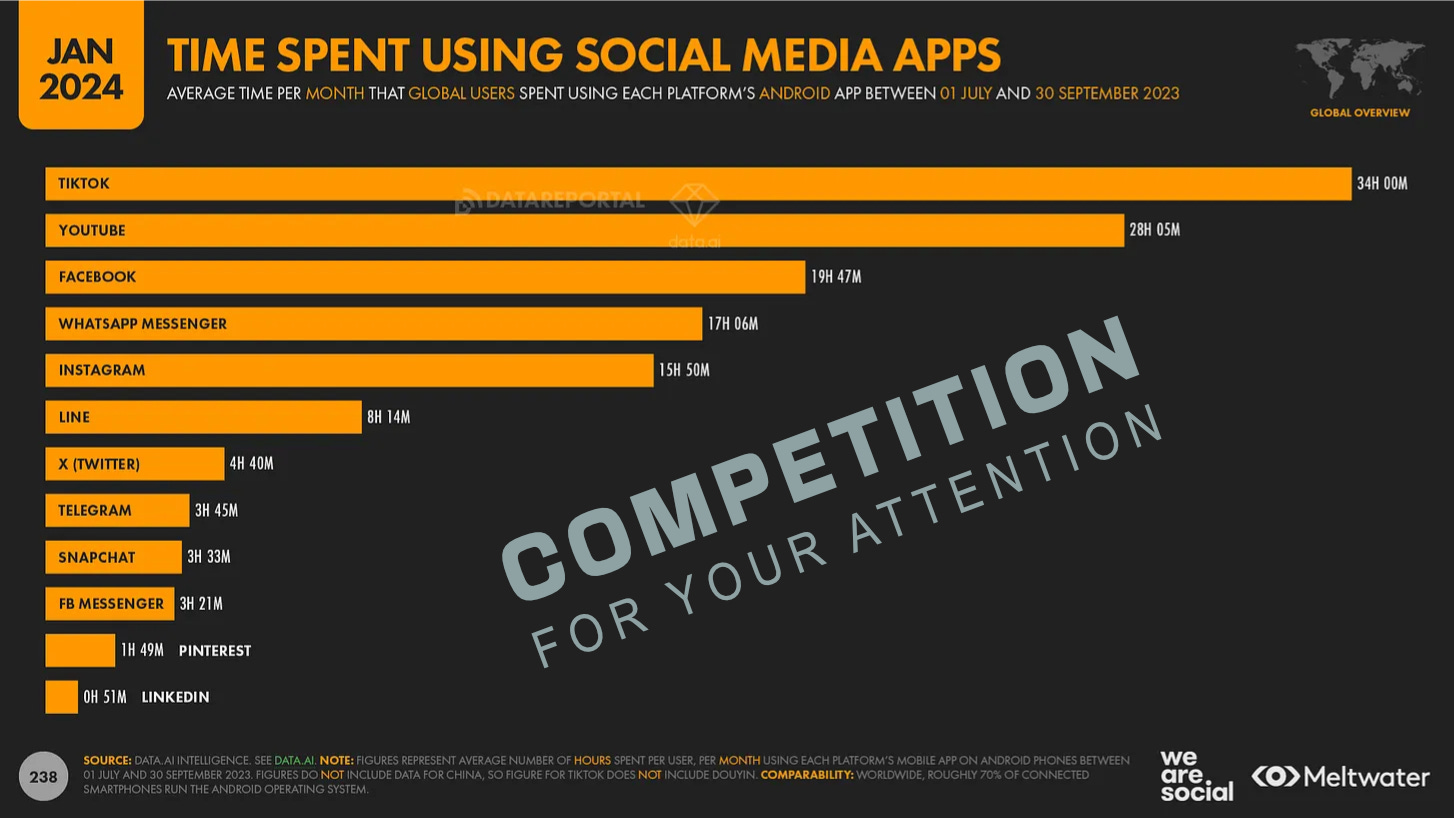The Catastrophe of Shiny Objects: Boredom, Attention, and Creativity
Technology is curing boredom and destroying creativity
The Attention Economy: The Market For Boredom
The architects of the modern digital landscape are optimizing all devices and services to exploit our desires. The human vulnerability - the need and love for attention and the disdain for boredom - is the result of a world in which our attention is the basis of the new economic model, to be harvested and monetized with ruthless efficiency. Attention is the new society's gold, being both the currency and object of irresistible appeal. Essentially your boredom is for sale as a prized commodity.
We wish to be entertained, to be cured of our boredom; every activity and task must be gamified, tracked, and rewarded so that we can complete our daily activities with maximum stimulation to our brains.
But what is the effect of the constant, never-ending stimulation that is nearly inescapable, as every mechanism, device, and service we utilize attempts to never let us leave its grasp? What is the toll this takes on our minds? What are we sacrificing in order to escape boredom?
As we narrowly focus on optimizing for user attention, we are also optimizing on the theft of the user’s productivity. The goal isn’t to aid the user to accomplish goals, rather it is to keep the user engaged on a platform, device, or service. It is simply to deliver an experience that triggers an addiction to the product that can be monetized.
Everything sends you a notification to keep you interested. A constant barrage from every app essentially saying, 'Hey, don't forget about me!'" And the scale of it all becomes enormous due to the number of devices and services we interact with, combined with the fact that they are all in competition with each other. So, they interrupt you more often, with more enticing sounds and visuals with pleasing animated interactions.
This constant barrage of activity begins to affect our behavior, as we then expect these notifications and interruptions. When they don’t occur, we seek them out to satisfy our attention deficit. Our sensory stimulation has become accustomed to being overloaded, and moments of calm feel uncomfortable.
We only have so much attention bandwidth. Attention is the compass of our mind. It is the direction or target of concepts, ideas, and dreams that we are processing, building, and resolving through thought. It is either consumed by the glimmer of external flashing stimuli that leads to a destination of nowhere, or it is consumed by our own intentions, leading to the destinies we choose, but not both.
Our modeling suggests that shorter attention cycles are mainly driven by increasing information flows, represented as content production and consumption rates. … producing and consuming more content results in shortening of attention spans for individual topics and higher turnover rates between popular cultural items. In other words, the ever-present competition for recency and the abundance of information leads to the squeezing of more topics in the same time intervals as the result of limitations of the available collective attention.
AI: Attention Imprisonment
Upper Echelon provides a glimpse in this clip of the utilization of AI to further optimize platforms for capturing your attention. The primary goal of the most used applications in existence is to do nothing more than capture your gaze on the glow of the screen while mesmerized by a reality that does not exist.
What might have been? The billions of hours lost, a civilization frozen, captured and restrained from thinking and building for its future.
Boredom: Is The Escape From The Attention Traps
So what happens when we successfully extinguish boredom? Have we simply cured a malady of the human condition? Or have we inadvertently intervened in a natural process that leads to unlocking our greatest potential?
Periods of boredom are essential for our brains "reset," where we enter modes of introspection and exploration. The problem is that the initial onset of boredom is uncomfortable and the benefits do not come immediately. We must persist through the uncomfortable state until the mind enters its creative mode, where it seeks to resolve its own boredom unaided by external stimuli.
Once we have successfully made it to the other side, the mind is in a greater state of natural exploration in which creativity, problem-solving, and introspection are enhanced. It is an oasis of insight that can only be reached by a trek through the desert of boredom.
Boredom is the prelude to profound discoveries.
It is the healthy state of mind which precedes moments of deeper introspection of the world.
Some will seek to cure you of your boredom, but they will take from you much more. -- Mind Prison
The trajectory on which we have oriented technology and its relation with civilization is pulling us into a behavioral trap of our own making. If we continue building ever more enticing, attention-stealing behaviors into everything we build, these will be significantly enhanced further by AI, which will optimize for these aspects far beyond what we could do before. What becomes of us all?
What are the long-term impacts? What is happening to the development of our young minds? Technology adoption is far outpacing our study of that adoption. We have no idea how disruptive this may be in the long run. But we do know that the ability to self-resolve boredom seems important.
What skills are involved during childhood to develop the ability to cope with boredom? We suspect it is play and narrative. To being able to avoid boredom during childhood must be related to the extent to which a child is able to play by itself in a fun way for as long as possible. In addition, a lot of our conversations with fellow humans consist of telling stories and interesting episodes, so narrative abilities are important for our lives.
Those narrative abilities are also acquired during childhood, and are related to thinking and imagination, which in turn lead to interest and motivation in many other things. In this sense, the developmental links between the “ability to play”, the “ability to tell stories” and the “ability to cope with boredom” could become topics of future research. -- The meaning of boredom
The race to solve our boredom may be hindering our own development of creativity, environmental adaptation, and cognitive skill. Whenever we artificially solve someone's boredom by directing their attention to shiny objects, we are intervening in a process that likely strengthens their mind and leads to improved future cognitive ability. Instead, we are replacing it with nothing: a mind stimulated but essentially inactive in the areas of novel reasoning. This is another unforeseen result of accelerating faster than we can comprehend the consequences.
“Tell me what you pay attention to and I will tell you who you are.”
― José Ortega y Gasset
Unlike much of the internet now, there is a human mind behind all the content created here at Mind Prison. I typically spend hours to days on articles including creating the illustrations for each. I hope if you find them valuable and you still appreciate the creations from the organic hardware within someone’s head that you will consider subscribing. Thank you!
No compass through the dark exists without hope of reaching the other side and the belief that it matters …





